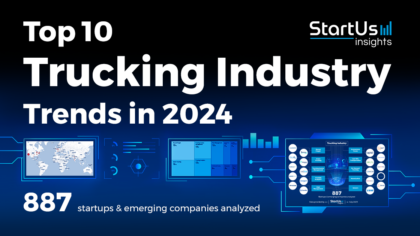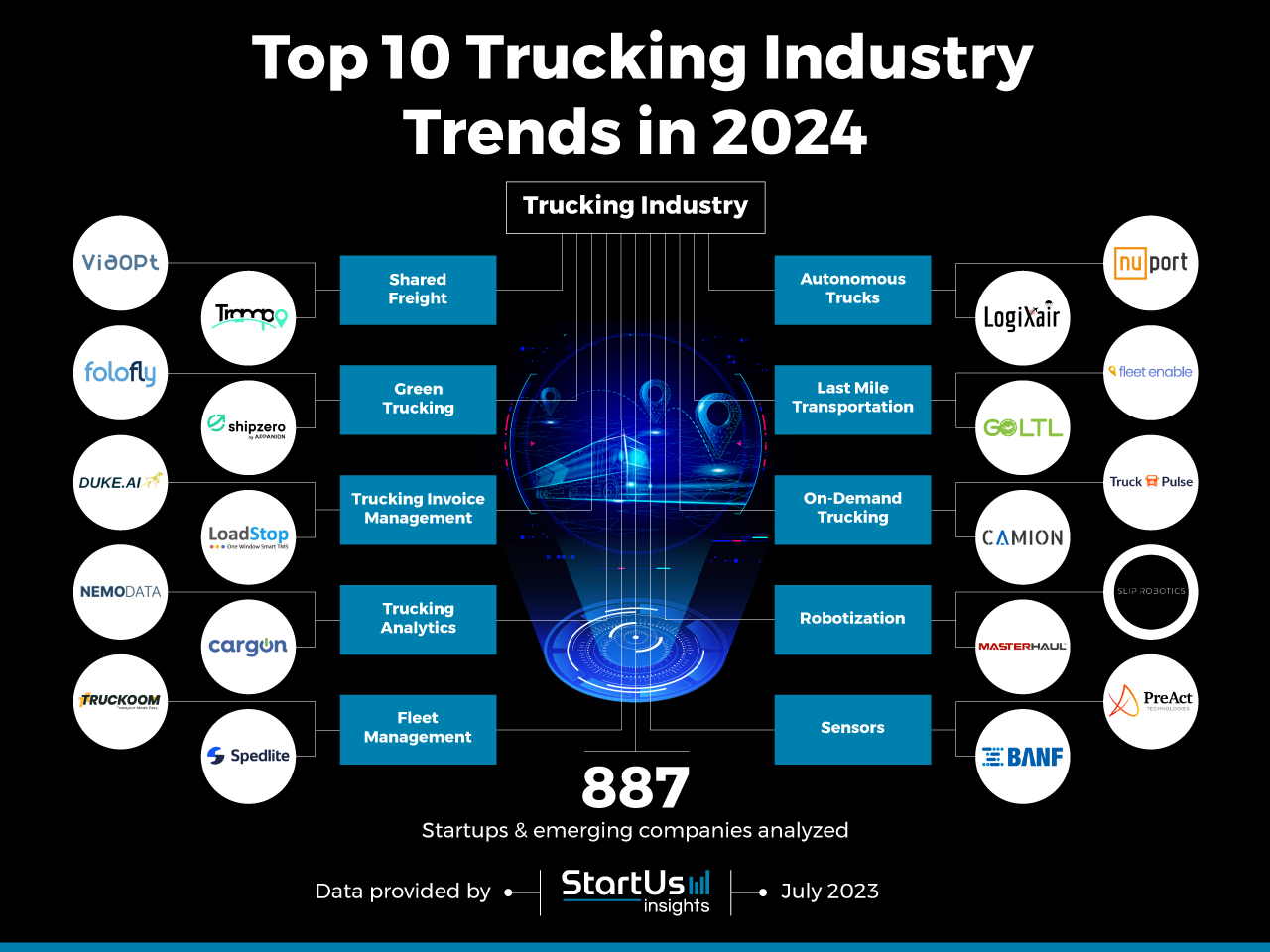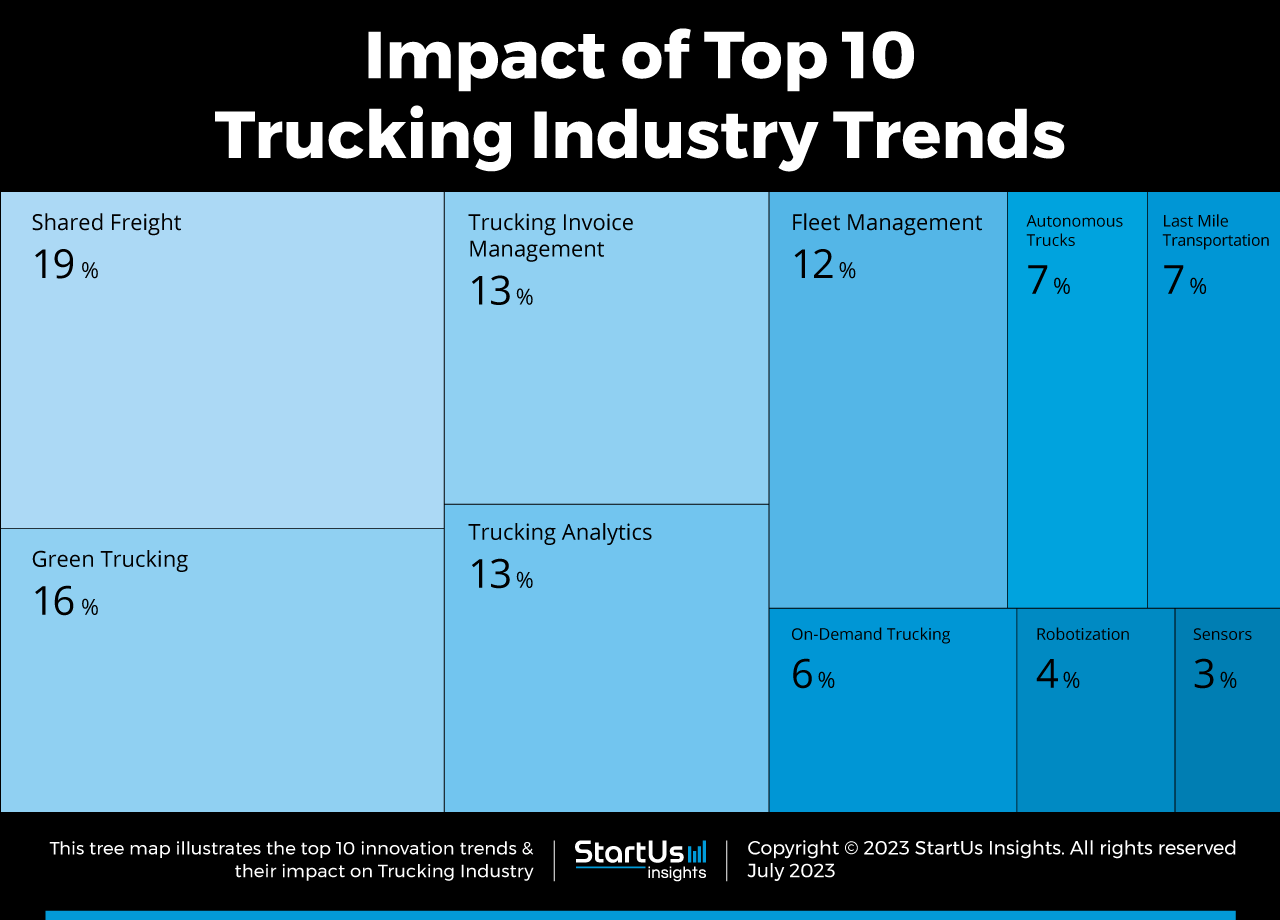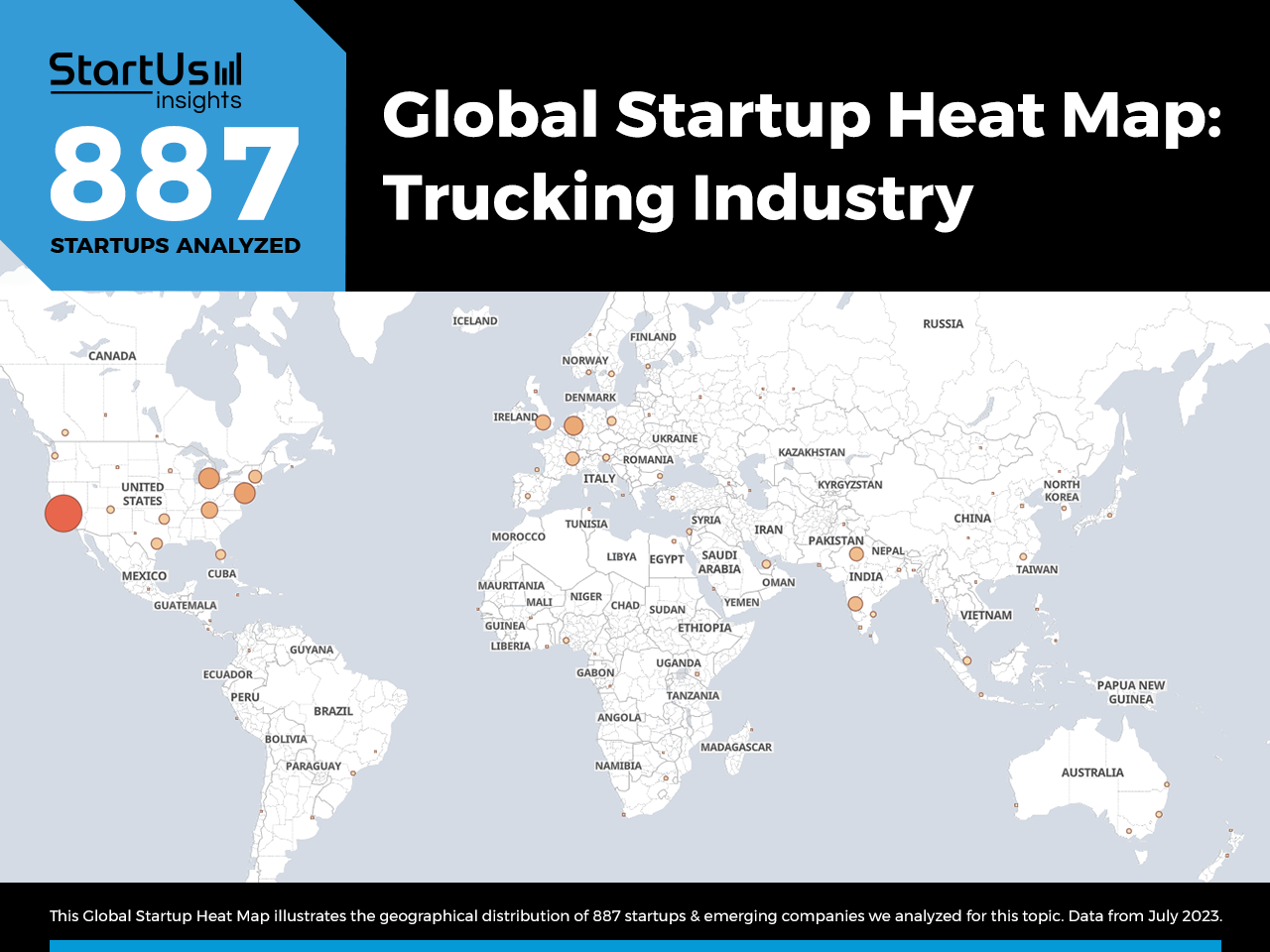The trucking industry is undergoing significant transformation, driven by technological innovations in logistics and sustainability, as well as driver and vehicle safety. For example, fleet management forms an emerging trucking trend to optimize truck performance and reduce fuel costs. Trucking analytics and invoice management, on the other hand, enhance operational efficiency and profitability while autonomous trucks and robotization improve delivery potential.
This research provides you with the top 10 trucking trends, ranging from shared freight and green trucking to on-demand trucking and last-mile transportation.
Top 10 Innovations in the Trucking Industry (2024)
- Shared Freight
- Green Trucking
- Trucking Invoice Management
- Trucking Analytics
- Fleet Management
- Autonomous Trucks
- OLast Mile Transportation
- On-Demand Trucking
- Robotization
- Sensors
Innovation Map outlines the Top 10 Trucking Trends & 20 Promising Startups
For this in-depth research on the Top trucking industry innovations and startups, we analyzed a sample of 887 global startups & scaleups. This data-driven research provides innovation intelligence that helps you improve strategic decision-making by giving you an overview of emerging technologies in the logistics and transportation industries. In the Trucking Industry Innovation Map below, you get a comprehensive overview of the innovation trends & startups that impact your company.
These insights are derived by working with our Big Data & Artificial Intelligence-powered StartUs Insights Discovery Platform, covering 3 790 000+ startups & scaleups globally. As the world’s largest resource for data on emerging companies, the SaaS platform enables you to identify relevant technologies and industry trends quickly & exhaustively.
Tree Map reveals the Impact of the Top 10 Trucking Industry Trends
Based on the Trucking Innovation Map, the Tree Map below illustrates the impact of the Top 10 Trucking Trends in 2024. Startups develop solutions for improving trucking efficiency and sustainability. Shared freight, the most prevalent trend, allows truckers to optimize their routes and reduce empty miles. Green trucking and autonomous trucks, as well as sensors and robotization, enable the reduction of fuel consumption and emissions.
The next trucking trends cover trucking analytics and fleet management, which lead to better decision making and performance monitoring on the road. Trucking invoice management and on-demand trucking further support the cash flow and flexibility of trucking businesses. Further, last-mile transportation improves delivery speed and increases customer satisfaction.
Global Startup Heat Map covers 887 Trucking Startups & Scaleups
The Global Startup Heat Map below highlights the global distribution of the 887 exemplary startups & scaleups that we analyzed for this research. Created through the StartUs Insights Discovery Platform, the Heat Map reveals high startup activity in the US, followed by Europe and India.
Below, you get to meet 20 out of these 887 promising startups & scaleups as well as the solutions they develop. These trucking startups are hand-picked based on criteria such as founding year, location, funding raised & more. Depending on your specific needs, your top picks might look entirely different.
Top 10 Trucking Innovations and Trends (2024)
1. Shared Freight
Shared freight involves sharing space, routes, warehousing, or distribution centers among multiple shippers. By consolidating shipments from different shippers into a single truck, shared freight reduces transportation costs and improves efficiency. It also offers faster transit times and less risk of damage compared to traditional less-than-truckload (LTL) options.
Many startups are leveraging technology such as matching algorithms, real-time tracking, and dynamic pricing to build shared freight solutions. Some examples of these services are shared truckload (STL), which fills a truck with shipments going to the same destination, and port-centric logistics. This optimizes the distribution of cargo from seaports to inland locations.
Viaopt enables Tuck Load Sharing
US-based startup Viaopt connects capacity from corporate trucking fleets with shippers who require trucking services. The startup uses a proprietary platform that automates the tendering process and provides real-time visibility of shipments. It leverages algorithms that match loads from multiple companies to share the cost and save time on shipments.
The Viaopt Collaboration tool optimizes capacity utilization through the matching of high and low-density products from multiple shippers. Whereas, the Viaopt Consolidation tool allows partial truckload shippers to share capacity with LTL shippers. Viaopt offers shippers access to trucking services while allowing fleet owners to monetize their idle resources and improve their bottom line.
Trampo Technologies offers Truck Hailing
Ugandan startup Trampo Technologies allows traders, shippers, and businesses to access a wide variety of trucks for their transport and logistics needs. For this optimal trucking, the startup uses a proprietary algorithm and matches truck drivers with shippers in real time. This is based on location, availability, and cargo type.
Further, it provides detailed quotations, trip invoices, and performance reports to ensure a secure delivery process. Trampo Technologies allows trucking companies to optimize the utilization of their fleets by tracking the status and availability of each truck.
2. Green Trucking
Trucking contributes to greenhouse gas emissions, particularly carbon dioxide, and also consumes a significant amount of resources. To solve these challenges, Green trucking is emerging. It involves reducing the environmental impact of freight transportation by using alternative fuels, electric trucks, hybrid trucks, and renewable energy sources. Green trucking lowers greenhouse gas emissions, fuel costs, and noise pollution while improving air quality and public health.
Emerging green trucking companies are developing technologies such as battery systems, hydrogen fuel cells, solar panels, and smart logistics software. Green trucking offers economic, social, and environmental benefits for customers, drivers, and communities.
Folofly builds Electric Truck
Japanese startup Folofly manufactures F1T, an electric truck, to reduce carbon emissions and energy costs. Its F1 TRUCK is a flatbed type vehicle and allows businesses to request customization such as adding a refrigeration unit or a special cargo box depending on their business needs. The electric truck has a load capacity of 1,150 Kg with a cruising range of 270 km. Further, Folofly provides infrastructure services such as battery exchange and smart charging solutions to reduce the barriers to EV adoption and operational costs after adoption.
Shipzero decarbonizes the Supply Chain
German startup ShipZero develops an emission management platform for shippers, logistics providers, and carriers. This platform provides trucking businesses with decision-focused information to manage their truck emissions. It allows the integration of various data sources and formats for data collection, checks data accuracy, and provides frequent updates on reducing emissions.
Further, the platform calculates emissions by combining inputs from direct energy consumption and activity-based modeling. Lastly, it facilitates one-click reporting to be used to implement emission reduction measures. With its platform, Shipzero enables businesses to reduce their environmental impact and transportation costs.
3. Trucking Invoice Management
Trucking invoice management systems are developed to address the inefficiencies of traditional paper-based invoicing, which is slow and prone to costly errors due to manual data entry. These systems ensure timely and accurate payments for the services rendered. It involves invoice automation, auditing and compliance, and digital payments to streamline the invoicing process, reduce errors and fraud, and improve cash flow.
Trucking startups are leveraging AI, blockchain, and cloud computing to enhance the efficiency and security of trucking invoice management. In today’s market, having an invoicing system is not only a necessity but also a competitive advantage for trucking companies.
Duke AI provides Automated Back Office
US-based startup Duke AI develops invoicing, audit, and payment software for the trucking industry. It uses machine learning to process documents, audit invoices, and generate payments in real-time. The startup allows carriers to build loads by emailing them load documents. Once the documents are transmitted to any party, the carrier is ready to be paid.
For each load transmitted, the startup creates a fraud risk score, which gives payers the confidence to pay carriers instantly. Duke AI helps trucking companies save time, money, and hassle by eliminating manual data entry, reducing errors, and improving cash flow.
LoadStop offers Automated Invoicing & Accounting
US-based startup LoadStop develops a cloud-based platform that offers billing and invoice management for truckers. It offers features such as one-click invoice creation, fast invoice sending to factoring companies and customers, accessorial charges updates, and accounting integrations.
This enables trucking companies to improve their cash flow, reduce manual labor, and track the entire invoice lifecycle from a single window. LoadStop also automates missing document checks and supports multiple carrier invoicing, thereby simplifying trucking invoice management.
4. Trucking Analytics
Inefficient routes, unpredictable maintenance needs, and suboptimal load optimization are a few of the challenges that the trucking industry faces. To solve these challenges, trucking analytics is employed to improve various aspects of the industry, such as route optimization, driver behavior analysis, capacity utilization, and predictive analytics.
By using advanced technologies such as AI, machine learning, cloud computing, and IoT, trucking analytics enables companies to reduce costs, increase efficiency, enhance safety, and optimize performance. This also enables better decision-making, planning, and execution. Startups are utilizing big data and analytics to develop load optimization, fuel management, and risk management solutions for the trucking industry.
Nemodata enables Data-driven Truck Optimization
Israeli startup Nemodata allows trucking companies to leverage their truck data to generate predictive insights about the health of their fleet. It uses proprietary virtual sensors and machine learning models to measure vehicle conditions, detect risks, and optimize maintenance plans.
The startup’s solution integrates with existing telematics and fleet data in the cloud and calibrates fleet actions through its models, which continue to learn from real-time vehicle behavior and operational decisions. Nemodata enables trucking companies to increase efficiency, improve performance, drive savings, and increase uptime.
Cargon establishes Logistics Indicators
Brazilian startup Cargon develops a platform that provides trucking companies with logistics indicators for their entire operation. The platform offers accurate information on loads in route, successful deliveries, deliveries with problems, and average time at each stage. It also offers financial indicators to help trucking companies optimize their logistics budget, reduce costs, and direct new investments to improve their logistics operation.
Additionally, the startup’s platform allows for consolidated logistics data analysis by selecting analysis periods, with month-by-month logistics performance indicators. This enables trucking companies to make informed decisions and improve their logistics operations.
5. Fleet Management
The trucking industry is faced with issues such as inefficient asset utilization and limited visibility into fleet operations. To resolve this, fleet management optimizes the performance and efficiency of vehicles, drivers, and fuel. It uses vehicle tracking and telematics to enable fleet managers to monitor the location, speed, and condition of their trucks in real-time.
On the other hand, driver management ensures the safety and productivity of drivers and their compliance with regulations and policies. Further, fuel management reduces fuel costs and emissions by implementing strategies such as route optimization, fuel-efficient driving, and alternative fuels.
Many startups are developing fleet management solutions leveraging technologies like AI and cloud computing to enhance the quality and reliability of fleet operations.
Truckoom provides Real-time GPS Tracking
UAE-based startup Truckoom develops, Tracks, a fleet management solution that captures millions of data points from a fleet of trucks, including speed, fuel consumption, tire pressure, and driver behavior. It uses advanced 4G GPS tracking and telematics to monitor and optimize the performance of both trucks and drivers.
This allows businesses to define zones and control their fleets, receive alerts for over-speeding, rash driving, and low fuel levels. With Truckoom’s real-time GPS tracking, businesses monitor their trucks and assets to improve their operations.
Spedlite offers Trucking Fleet Management
Lithuanian startup Spedlite develops dispatch software that streamlines fleet efficiency for trucking companies. It uses artificial intelligence and data aggregation to automate the process of finding and assigning the best loads for each truck. The software has an intuitive and simple interface that mimics the classic whiteboard.
The startup aggregates data from load providers such as BnsfLogistics, Knightlogistics, EchoDrive, NavisphereCarrier, Rhinovision, and more. Spedlite AI assistant takes into account many data points to offer the best internal load assignments, maximizing fleet efficiency and minimizing empty miles.

6. Autonomous Trucks
To mitigate the issue of driver shortages, safety concerns, and high operational costs in trucking, autonomous trucks, also known as self-driving trucks, are developed. These trucks operate without human intervention, using sensors, cameras, radar, and AI to navigate the roads and avoid obstacles.
Several startups are developing and testing autonomous trucking solutions to navigate various terrains and weather conditions, employing real-time monitoring and intervention systems. As autonomous trucking evolves, it will lead to more IoT integration, regulatory changes, and a hybrid model of human and autonomous trucking in the future.
NuPort Robotics facilitates Autonomous Trucking
Canadian startup NuPort Robotics develops a proprietary autonomous driving technology for supply chains. It leverages the NVIDIA DRIVE to facilitate autonomous trucking for middle-mile short-haul routes. The startup deploys Level 2 autonomy, which includes advanced driver assistance systems, data analysis, and driver suggestions. NuPort Robotics‘ solution leads to safer and more efficient vehicle performance.
LogiXair builds Aerial Pickup Trucks
Dutch startup LogiXair manufactures aerial pickup trucks. These trucks carry detachable containers and have vertical take-off and landing (VTOL) capability with fixed-wing flight. This increases its performance, durability, and flexibility, and allows it to operate in narrow and crowded spaces. Moreover, it employs route optimization techniques to minimize delays.
The startup also runs automated Drone Docks that facilitate the loading and unloading process of cargo containers. LogiXair establishes a network of aerial corridors that enable faster connectivity of cargo across regions.
7. Last Mile Transportation
While delivering goods to their destination, trucks face several challenges such as road congestion, customer unavailability, and delivery errors. To address these challenges, many trucking companies are adopting crowdsourced delivery, real-time tracking, and communication technologies.
Crowdsourced delivery allows truckers to outsource the last-mile delivery to local drivers who use their own vehicles and routes. Real-time tracking and communication enable truckers and customers to monitor the delivery status and communicate any issues or changes. Startups work on these technologies and more to improve the efficiency, speed, and customer satisfaction of last-mile transportation.
Fleet Enable automates Last Mile Logistics
US-based startup Fleet Enable develops a final mile automation platform. Its Capacity Optimization feature calculates cargo size and truck capacity using AI. It also enables electronic order creation, dispatch scheduling, and route planning. It eliminates shipment failures by considering various factors such as appointment windows, truck availability, truck floor space, and maximum weight. Fleet Enable automates the entire final mile delivery process and reduces manual calculations
Go LTL provides Asset-Based Final Mile Solutions
Go LTL is a US-based startup that develops Go Truck Hub, a software that connects logistics professionals with its own fleet of trucks. It enables less-than-truckload (LTL) shipping and last-mile deliveries. Further, it offers features such as live tracking, automated delivery orders, and instant driver communication.
The startup also offers specialized services such as airport transfer and local pickup and delivery. By combining partial loads into multi-stop truckloads, Go LTL allows freight forwarders, shippers, manufacturers, and event organizers to save time and money.
8. On-Demand Trucking
Many trucks on the road return empty or under load, which leads to higher costs and emissions. On-demand trucking resolves this issue by providing shippers and carriers with instant quotes, real-time visibility, and flexible capacity options. By using advanced technologies such as cloud computing and AI, on-demand trucking platforms match supply and demand more efficiently.
This reduces operational costs and improves customer satisfaction. Besides being a convenient choice for shippers, on-demand trucking also offers an opportunity for carriers to find more loads and plan their routes better. Several startups are innovating in this space by offering features such as real-time freight matching, automated paperwork, and dynamic pricing for the trucking market.
Truck Pulse offers Intuitive On-demand Trucking
Indian startup Truck Pulse develops a cloud-based intuitive truck and logistics software to provide on-demand trucking services for the logistics and transportation industry. The truck aggregator platform facilitates communication and collaboration between shippers, drivers, and carriers. It enables shippers to book and track shipments, drivers to receive and complete shipment requests, and carriers to manage their fleets and operations.
The startup also offers a freight bidding marketplace where shippers and transporters negotiate the prices for their cargo. Truck Pulse optimizes freight management operations, enhances customer satisfaction, and lowers operational costs for all stakeholders in the trucking industry.
Camion builds Truckers & Shippers Connection Platform
Saudi Arabian startup Camion provides on-demand trucking solutions for the logistics industry. Its platform streamlines the booking, searching, paying, and issuing of transport documents. It leverages AI and machine learning to optimize the transport route and ensure timely delivery. It also allows trucking companies to list their trucks, drivers, and destinations and receive rates instantly.
This ensures that the trucks are loaded on the return trip. Camion enhances the quality of logistics services by providing automation and management of logistics operations, fleet management, load verification, and cargo insurance.
9. Robotization
Robotization addresses the challenges of driver shortage, fatigue-related safety risks, and productivity constraints in the trucking industry. It enables more rapid, secure, and efficient operations.
Automated systems for loading and unloading reduce the time and labor needed to transfer goods between trucks and warehouses. Automated guided vehicles (AGVs) navigate complex environments and transport materials without human involvement. Robotic process automation (RPA) simplifies administrative tasks and optimizes workflows.
Various startups are adopting AI, machine learning, computer vision, and sensors to create robotic trucking solutions.
Slip Robotics manufactures Loading & Unloading Robots
US-based startup Slip Robotics develops an automated truck loading and unloading solution for the trucking industry. The slip robots handle trailers quickly, without requiring any modifications to the docks or trailers. Moreover, they provide drivers with precise information on payload weight and balance.
They also monitor and report various freight-specific metrics in real-time, such as GPS location, trailer temperature, weight, acceleration, and movement, among others. Slip Robotics eliminates driver detention, reduces material handling damage, improves safety, and increases throughput at the docks for trucking carriers.
Masterhaul builds a Robotic Cargo System
US-based startup Masterhaul creates robotic cargo systems for trucks. Its product, the PowerLoader, allows humans or autonomous trucks to load and unload cargo automatically. It lifts, dumps, and exchanges the entire truck bed area, not just the tailgate. Moreover, it uses various AppDecks, which are attachments that allow it to perform different functions such as storage, delivery, or contracting.
Some of its AppDecks include the All Purpose Bin, Portable Storage, MasterTrax, and Contractors. Masterhaul’s robotic cargo systems enhance productivity, reduce work-related injuries, and optimize cargo handling and transportation.
10. Sensors
To avoid truck maintenance problems and mechanical breakdowns, secure the cargo, and prevent vehicle theft, sensors are widely used. The sensor technology improves safety, efficiency, and performance. A common sensor used in trucking is the tire pressure monitoring system, which tracks the air pressure and temperature of each tire and warns the driver of any issues.
Another vital sensor is the temperature sensor, which monitors the ambient and cargo temperatures and prevents overheating or freezing. Another sensor is the weight sensor, which measures the load weight and distribution and helps to improve fuel efficiency and avoid fines.
Many startups are using cloud computing, predictive analytics, and data visualization to create safety, cargo, GPS, and traffic sensors for the trucking industry.
PreAct Technologies develops Flash LiDAR sensors
US-based startup PreAct Technologies provides software-definable flash LiDAR sensors for the trucking industry using Continuous Wave Time of Flight (CWToF) technology. Its product, Borrego, detects and tracks near-field objects with millimeter accuracy, high resolution, and fast frame rates. These sensors also enhance various advanced driver assistance systems (ADAS) and autonomous vehicle (AV) applications.
This includes vehicle clearance detection, trailer pin position sensing, advanced parking assist, vulnerable road user detection, dock height and distance detection, usage-based insurance, and more. PreAct Technologies predict and prevent crashes to reduce fatalities and injuries and save lives.
BANF builds Truck Tire Sensor System
South Korean startup BANF develops iSensor System, a tire sensor system that uses distance-adapted power technology to monitor tire conditions and road surfaces. The startup’s solution identifies tire abnormalities and enables preventive actions to avoid accidents. It measures the tire pressure, temperature, tread depth, and wear patterns of each tire and notifies the driver or fleet manager of any possible problems.
BANF improves fuel efficiency, reduces accidents caused by tire issues, and supports the effective operation of autonomous trucks and fleets.
Discover all Trucking Trends, Technologies & Startups
The trucking industry is undergoing major changes and increasingly adopting technologies from blockchain and AR to 3D printing and advanced analytics. 3D printing, for example, changes the management of spare parts, enabling on-demand production, which further lowers inventory costs and downtime. These technologies are creating a more efficient, safer, and environmentally friendly future for the trucking industry.
The trucking trends and startups outlined in this report only scratch the surface of trends that we identified during our data-driven innovation & startup scouting process. Identifying new opportunities & emerging technologies to implement into your business goes a long way in gaining a competitive advantage.















